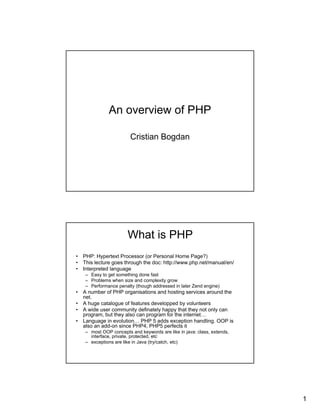
An overview of the PHP programming language
- 1. An overview of PHP Cristian Bogdan What is PHP • PHP: Hypertext Processor (or Personal Home Page?) • This lecture goes through the doc: http://www.php.net/manual/en/ • Interpreted language – Easy to get something done fast – Problems when size and complexity grow – Performance penalty (though addressed in later Zend engine) • A number of PHP organisations and hosting services around the net. • A huge catalogue of features developped by volunteers • A wide user community definately happy that they not only can program, but they also can program for the internet… • Language in evolution… PHP 5 adds exception handling. OOP is also an add-on since PHP4, PHP5 perfects it – most OOP concepts and keywords are like in java: class, extends, interface, private, protected, etc – exceptions are like in Java (try/catch, etc) 1
- 2. What can PHP do • CGI scripting of course – Based on escapes within HTML pages <?php > or <% … %> • Command line scripting • GUI applications (PHP-GTK) http://gtk.php.net/ Installation • Install the PHP interpreter separately. There is good support for this on Linux • In the webserver configuration, associate the php extension with the PHP interpreter • For serious applications you will need a database engine. • Apache is the typical choice for the web server. – Integrated as a module, so no supplementary processes are created (in CGI, typically there is one process per access, which is very expensive) • Mysql is the typical db engine 2
- 3. PHP in HTML • The most often case where PHP is used • Escaping – <?php …. ?> – <? …. ?> – <script language=”php” > ….</script> – <% .... %>, <%=. … %> like ASP and JSP • Like in JSP, escaping can be interrupted to write some HTML <?php if ($expression) { ?> <b>This is true.</b> <?php } ?> • You can see the evolution under community pressure, here and in other areas Types • a variable name begins with $, no type declaration (type declaration can be required by passing some settings to the interpreter) • can have one type first, another one later… (BASIC??) • boolean, integer (similar to C), float (similar to C) • string – single-quoted, no character escapes – double-quoted, like C character escapes – <<< EOD notation to write longer multiline strings – $a.$b appends the string b and at the end of the string a (+ in Java) – $a(index1, index2) gives a substring – string functions in the function library (strlen() like in C) – expression intergration ”some text { expression $var } blabla” • arrays are mappings between keys and values (Dictionary/Hashtable/Map in java) – $arr = array("foo" => "bar", 12 => true) • There are automactic type conversions between types (very dangerous…). Explicit type conversions exist too 3
- 4. Other types • Classes and objects, OOP • Resources, a kind of reference • Pseudo-types, a kind of #typedef ? Variables • See Types • Assignment by value (not by reference) • Programming for the lazy • Lots of predefined variables, especially related to HTTP/CGI – _SERVER, _GET, _POST, _COOKIE, _FILES, _REQUEST, _SESSION • Scope of variables, globals • Variable variables ☺ • External varialbes, useful for forms • Functions as variables 4
- 5. Other procedural stuff • Operators similar to C • Statements similar to C, plus: – <? if(…) : ?> ….<? endif; > – foreach () through arrays, just values, or also keys • foreach (array_expression as $value) statement • foreach (array_expression as $key => $value) statement • Code inclusion with require() and include() • Conditional function definition (similar to C #ifdef ) Features • HTTP authentication, cookies, file uploads • Remote files (like java.net.URLConnection) • Connections (like java.net.Socket) • Persistent db connections – Normally db connections are defined with engine specific functions as external resources. Each access would open its connection, that is expensive 5
- 6. Functions • Array functions, calendar fuctions, date functions, character functions, IO functions, printer, file/directory, etc • Functions for protocols/standards, e.g. FTP, HTTP, URL, LDAP, IRC, Mail, NSAPI, popmail, XML/XSL, Bzip2/Zip/Zlib • Functions for various databases (Mysql, Oracle, MS SQL server, mSQL, PostgreSQL, SQLite, dBase), dbx is general • Functions for other systems/tools: e.g. Apache, COM, Cyrus, PDF, dBase, DBM, DOM, .NET, Lotus Notes, GNU readline, Hyperware Conclusions • Easy to learn from Java or C • CGI parameters, HTTP sessions, etc are easy to recognize • Good language/system for doing something small fast (but then JSP/ASP do most of the same) • Not a wise choice for a serious/large project due to the lack of type safety, lack of OOP in the libraries, etc. – Experienced PHP people confirm that larger projects tend to become a big mess due to the freedoms that seemed so good in the begining, which make programmers lazy • The array concept is nice, but its name is misleading (array means something very different in all the rest of Computer Science) • Still, a very good choice for pragmatists who want to get the job done. 6